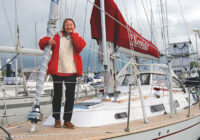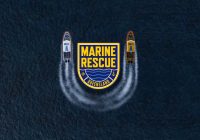Maritimo Destinations. Alaska: Immense. Abundant. Untamed. Unfiltered. Enticing. Enchanting.
Alaska’s magic lies in its unspoiled raw beauty, its hidden fjords, towering glaciers, secluded coves and uninhabited islands, all teaming with an abundance of wildlife. It is often thought of as ‘The Last Frontier’. You can spend weeks exploring these pristine locations with family and friends, far away from the crowds.
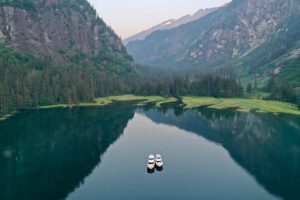
There are currently three Maritimos cruising the Alaskan waters. M600, M48 and an M52. No doubt, this is proof and testament to Maritimo’s renowned pedigree with genuine blue water capabilities, on board ride, safety, and comfort, as well as enhanced amenity from their large spaces and liveability, perfectly matched to their long-range capabilities. Cruising speeds well into the 20s, along with high sprint paces are also advantageous in places where the weather is known to change its mind frequently.
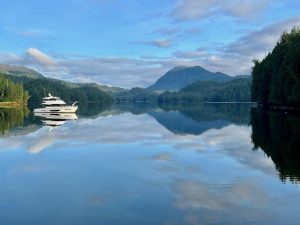
The best time to visit Alaska is during the summer months of late May to early September, when there is between 18 to 20 hours of daylight, and temperatures are milder, ranging between 50 to 70 degrees Fahrenheit (10 to 21 Celsius).
The height of the tourist season is between mid-June to August. This is the best time to see wildlife, including the magnificent humpback whales, orcas, sea lions, seals, Sitka deer and bald eagles. Bear activity is high, particularly during the salmon runs of July and August. Glaciers are also more active during this time.
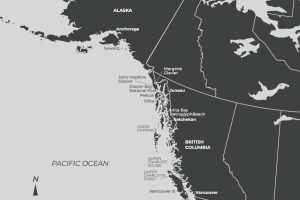
The Inside Passage is perhaps the most famous cruising area in Alaska. It is made up of more than 1000 islands, stretching nearly 1000 miles from the Southeastern corner of Alaska, then through the Western reaches of British Columbia in Canada, and on to the Northwest corner of Washington State USA, and spans around 50 miles East to West. The water in this area is relatively calm, protected from the Pacific Ocean storms by the islands that line the coast.
This network of fjords, channels and islands are rich in natural beauty and cultural history. There are several must-see locations in the region, including Glacier Bay National Park, Tracy Arm Fjord, and Misty Fjords National Monument, as well as some of the charming towns like Juneau, which is the capital of Alaska, Ketchikan and Sitka.
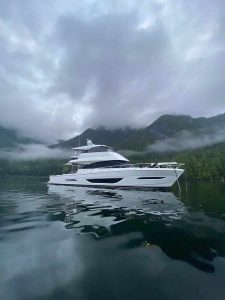
Glacier Bay National Park is a UNESCO World Heritage Site covering over three million acres of stunning wilderness. This is where some of Alaska’s most impressive glaciers flowing down from the mountains to the sea, and are subsequently referred to as tidewater glaciers.
The largest of the 11 tidewater glaciers in Glacier Bay is known as The John Hopkins Glacier. It is one of Alaska’s most picturesque glaciers surrounded by steep mountains, but due to its more secluded location in the park, it is not as crowded as the equally impressive Margerie Glacier.
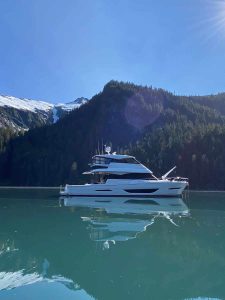
The Margerie Glacier is one of the few glaciers that is advancing. At about 21 miles long and 250 feet high, it is one of the most active and accessible glaciers in the park. Its towering face can be approached by boat offering a front row seat to the calving ice.
It is both breathtaking and awe-inspiring to witness these massive rivers of ice calving into the sea. Calving is the process where blocks of ice up to 60 metres high break off, falling into the water with tremendous force. Accordingly, it is recommended that you only approach to within two miles when this is occurring.
Glacier Bay is also a haven for wildlife. Apart from the abundance of marine mammals. there is an amazing variety of fish making it a great location for fishing. In addition to this rich marine life, the park is home to bears, mountain goats, and a huge diversity of birds.
Misty Fjords National Monument, known as ‘The Yosemite of the North’, is another must-see destination with its stunning scenery of sheer cliffs, plunging waterfalls, and lush rainforests. The area is often bathed in mist adding to the mystical atmosphere.
Ketchikan is a great place to visit and stock up with supplies. Known as the ‘Salmon Capital of the World’. The Salmon run is an incredible sight with thousands of salmon returning to their spawning grounds in the late summer. The area is also famous for its collection of Native American totem poles, and vibrant arts scene.
Wrangell is the gateway to the Stikine River, one of the last truly wild rivers in North America, and is most definitely another area worth considering putting on your list. Here you will also fine Anan Creek Bear Observatory. It is one of the best places to see both black and brown bears in their natural habitat, especially during the salmon runs. Petroglyph Beach with its ancient petroglyphs carved into the rocks along the shoreline is very impressive.
Cruising in Alaska offers an unparallelled experience, with some of the most incredible landscapes, natural scenery, and inspiring wildlife encounters on offer in the world. As there are so many stunning locations to explore, it is important you do your research prior to discover which regions you want to visit.
Some areas are best seen at certain times of the year. There are some areas, such as the Glacier Bay National Park, that require permits for entry. Please do apply well in advance for any permits you require, as only 25 private vessels per day can be in the area at any one time from June 1 through to August 31 (See https://www.nps.gov/glba/planyourvisit/boating.htm for exact details). You will also need to understand the local regulations, especially as they pertain to fishing and wildlife viewing rules for the areas you wish to visit.
Due to the remote nature of many areas, limited services, and variable weather conditions, very careful planning and preparation are required to ensure you and your guests have a safe, enjoyable, and memorable trip. It is also important that you plan your route with flexibility in mind, allowing for changes based on the weather conditions.
Alaska’s unpredictable weather does require regular monitoring. Communication can be challenging in Alaska, with cell phone coverage very limited. A satellite phone and/or Internet link, or VHF radio is essential for receiving weather updates and staying in touch with the outside world.
Maritimo Factory Sales Specialist – Americas, Mark Mansfield, reflected upon a statement from Mike Crabtree, the M48 owner currently cruising in Alaska, who said, “In my previous vessel I usually cruised at about eight knots, but I can’t tell you how much safer and more enjoyable it is to run at 30 knots when I have to get out of the way of weather and run for more protection.”
Even during the summer months there can be cooler temperatures, rain and fog. “As well as the great performance of the M48, the enclosed flybridge is a big advantage in bad weather,” added Mike.
It is also important to consider the timing of your trip in relation to wildlife migration and seasonal events. Between June and September is the best time to see the humpback whales. The salmon run, which attracts the bears to the rivers, usually occurs between July and August.
Alaska’s coastline is complex, with numerous islands, fjords and channels presenting a unique set of challenges for navigation. The waters can be shallow in some areas, with shifting sandbars and underwater hazards. It is important to carry detailed charts and guides specific to the areas you plan to visit, on top of modern navigation tools including, GPS, radar and depth sounder.
Safety is paramount when cruising in Alaska, particularly in remote areas, as help may be far away. It is essential that you carry all the necessary safety gear, including life rafts, EPIRBs, flares and first aid supplies. It is also important that you have a detailed plan for emergencies, including medical issues, mechanical failures and severe weather.
The tidal ranges (sometimes exceeding 20 feet) and currents in Alaska can be significant, particularly in the Inside Passage. So, great care needs to be taken when selecting a location and setting your anchor. However, there are a number of designated anchorages in the Inside Passage. Some, like Bartlett Cove in Glacier Bay, do require a permit, which you will need to apply for before arrival.
South of Wrangell Island is Anita Bay, which is a well-protected anchorage with good holding ground. It is a great spot to watch the wildlife, especially bears during the salmon runs. Crescent Harbour is another well protected anchorage near Sitka, which also offers many restaurants, shops and historical sites to enjoy.
Provisioning for the trip also requires careful attention as supplies and services can be limited, and it may be a week to 10 days between restocking options depending on your plan. Larger ports like Ketchikan, Juneau and Seward offer shops where you can restock and refuel. Fishing is also a great way to supplement your provisions with species including salmon and halibut.
While the journey requires careful planning and preparation, the rewards are well worth the effort. Alaska’s untamed wilderness, abundant wildlife, and breathtaking landscapes provide what can only be described as an unforgettable experience.






